Manchester Arena Inquiry: One paramedic at scene for 40 minutes after blast
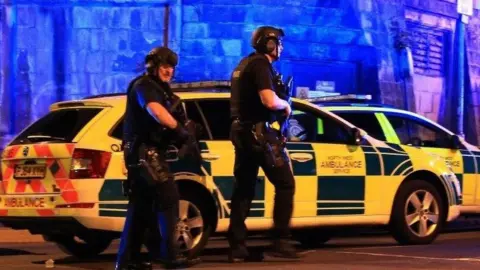 PA Media
PA MediaOnly one paramedic was at the scene of the Manchester Arena bombing for the first 40 minutes after the explosion, an inquiry into the attack was told.
Twenty-two people were killed and hundreds more injured when Salman Abedi detonated a suicide bomb as 14,000 fans left the arena in May 2017.
The inquiry heard the sole paramedic had arrived in the arena foyer 18 minutes after the bomb went off.
But at least eight ambulances had arrived nearby after 40 minutes.
Lead counsel Paul Greaney QC said the public inquiry would have to consider whether lives were lost as a result of a failure to co-ordinate the response of emergency services.
Within 10 minutes of the bomb exploding at 22:31 BST, 12 British Transport Police (BTP) officers had run into the arena foyer carrying first aid.
Casualties were carried out on makeshift stretchers and only one actual stretcher was used on the night of the attack.
The final person was evacuated from the City Room - where the bombing happened - at 23:40 on a stretcher "made of cardboard and a crowd control barrier".
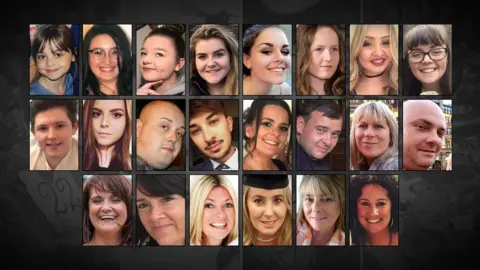 Family handouts
Family handoutsThe inquiry also heard how John Atkinson, who was killed in the bombing, was only evacuated from the scene 46 minutes after the blast on a makeshift stretcher to a triage area nearby.
He remained there for another 24 minutes but chest compressions were only started on him one hour and 15 minutes after he was first injured in the blast.
"The issue of John Atkinson's survivability is, as we shall explore, a significant issue for the inquiry to consider," Mr Greaney added.
The inquiry was told BTP had primary responsibility for policing in the arena foyer and Greater Manchester Police (GMP) was not aware "at an organisational level" of the Ariana Grande concert.
"On the face of it that may seem surprising," Mr Greaney added.
He said BTP had "primacy" in this area due to the proximity of Victoria Station and the inquiry must consider whether that affected preparedness for any terror attack.
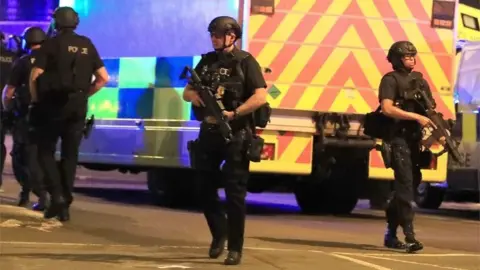 PA Media
PA Media"There is a legitimate question about whether it was appropriate that BTP, who specialise in the railways, should take the lead," he added.
Following the blast, BTP declared a major incident at 22:39 but they did not communicate this to GMP and there was no attempt to integrate communications at the arena.
The inquiry heard the BTP officer, who thought he was acting as operational commander, was in Blackpool when the bomb went off.
He took a taxi to Manchester but "by the time he arrived the need for an immediate response had long since passed".
Mr Greaney said it appeared "no one acted as a BTP operational commander for the policing response to the bombing".
GMP did not declare a major incident until 01:00 on 23 May, the inquiry heard.
The second day of the hearing was told there had been multi-agency exercises rehearsing for a terror attack, including one in 2016 for an incident at the Trafford Centre.
Mr Greaney said "experts have expressed serious concerns about whether the necessary lessons were learned from it".
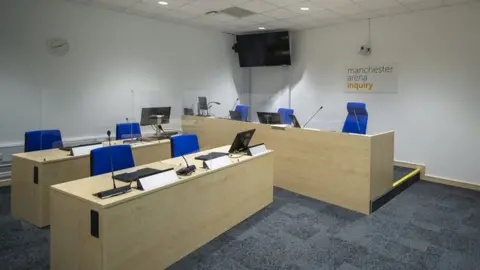 PA Media
PA MediaAnother exercise, held in July 2016, rehearsed for an attack in the City Room at the arena - the exact scene of the attack in May 2017.
The inquiry is seeking to establish whether BTP took part in that exercise.
The first fire engine, which had stretchers, arrived at Manchester Arena two hours and six minutes after the explosion.
"An important issue for the inquiry to investigate will be how that came to pass and whether it made any difference," Mr Greaney added.
But he told the inquiry it was "important we acknowledge the pressure that those who responded were under".
"The inquiry process must not be used to vilify those who did their best on the night but made mistakes and could have done better," he added.
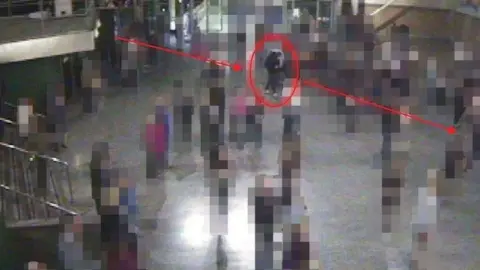 GMP
GMPBTP officer Jessica Bullough, who was first to enter the foyer, described the scene of the attack as like a "war zone".
Two minutes after the explosion, PC Bullough radioed through, saying "it's definitely a bomb - people are injured - at least 20 casualties".
She then "made the first of a number of requests for ambulances".
The inquiry was told that 24 minutes later another officer radioed to control, saying "you're going to hate me - where's our ambulances please?".
Control replied, saying "we don't know. We're calling them again".
The public inquiry follows a trial in which a jury found Hashem Abedi guilty of helping his older sibling to plan the atrocity.
He was jailed for at least 55 years on 20 August for the 22 murders.
The chairman of the inquiry Sir John Saunders will make a report and recommendations once all the evidence has been heard, which is expected to take up to six months.

Why not follow BBC North West on Facebook, Twitter and Instagram? You can also send story ideas to [email protected]
